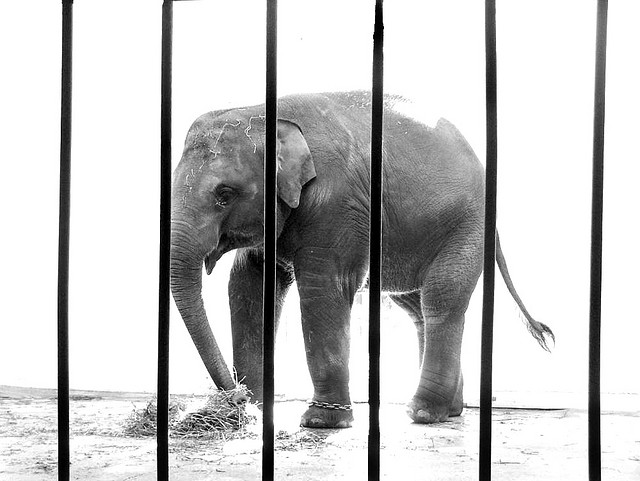I’m an inter-sectional vegan. I choose veganism because it is how I can enact my belief that food should be positive, vital, and free from oppression. I’m also a feminist and an advocate for racial and economic justice. Author of The Color Purple and activist Alice Walker said, “The animals of the world exist for their own reasons. They were not made for humans any more than black people were made for white or women created for men.” Being vegan and advocating for a more just community, country, and food system in the past six years has made me reflect on my values in profound ways. I’ve learned another reason I am vegan; because I value freedom.
Freedom may be the single most acknowledged American value, but it’s certainly not ubiquitous in the U.S, where the prison industrial complex has been born of white supremacy and classism. Currently more than 2 million people are incarcerated in U.S. jails and prisons. Of those people approximately 25% are non-citizen and about 40% are black. Furthermore, low-income people are disproportionately represented in prisons. About 60% of those incarcerated in the U.S. lived below the poverty line prior to being locked up. As reported by the Hamilton Project, a subset of the Brookings Institute, there is a 70% chance that a black male with a high school diploma will be imprisoned by his mid-thirties. While black Americans make up approximately 12-13% of the population, the U.S. Department of Justice reports about 60% of male inmates in prisons and jails are black.
Why do we as a society accept such systematic injustice? It’s interesting to hear the responses people have to justify maintaining prisons, which sound disturbingly like the arguments in support of animal farms. We are told that we need both prisons and animal farms as they are “necessary evils,” when in fact, both are systems of oppression–one of humans, and the other of animals, but both of sentient and intelligent beings. In this sense, to stand for human rights is to stand for animal rights, and vice versa.
Prisons are argued to be institutions which make our communities more safe from violence and crime. But in America, 60% of those released from prison will be re-incarcerated in less than one year. In California the recidivism rate is nearly 70%. Probation and parole are their own versions of prison, remaining criminalized after release and “failing” background checks the rest of your life. The prison system creates more prisons just as trauma begets trauma. With a record you do not qualify for public housing, federal Pell grants for college, or basic employment by most employers. The emotional, financial, social, physical, and psychological costs to the individual, family and community are incredibly high.
The Ella Baker Center for Human Rights recently released a report titled “The True Cost of Incarceration on Families,” gathering data from many studies exploring where this costly industry is getting its economic power. The costs to the family of the imprisoned include: astoundingly large debts from prison/jail phone calling fees, travelling to visit loved ones, missed days at work due to psychological stress, legal fees and losing a breadwinner, worker and often a co-parent in a family. Most of the costs are externalized directly onto families, disproportionately families of color. Analogous to the brunt of labor born by dairy-producing females on animal farms, women bear the brunt of emotional and financial costs of incarceration. According to the report, “Of the family members primarily responsible for incarceration costs, 83% were women.”
What does it mean to be the offspring of the people incarcerated or the offspring of an animal in a factory farm? If you are the child of a parent who has been incarcerated you are six times more likely to be incarcerated in your lifetime. If you are the child of a cow living on a factory farm you are going to be killed or be violently confined for a few months so you stay soft then be killed for veal. Prisons filled with marginalized people produce more people marginalized from opportunity who often commit more crime. Animal farms filled with sick animals produce sick human animals.
I’m writing this because I am concerned about the cognitive dissonances and the lapses in morality that we accept as normal. Are we treating people of color the way we treat cattle, and cattle the way we treat people of color?
What would the world look like if we released our grip on cages? What is freedom to these oppressed people and oppressed animals? It is good schools that provide education, nutrition, inspiration and motivation for a better future. It is the farm sanctuary. It is the unlikely friends you make who bring you so much connection, joy and humility. It is the first paycheck on the outside from an employer that opts out of discriminatory background checks. It is the plant based diet farm. It is the group of people who hold you. It is the circle of people who restore with you. The group that gives economic empowerment without producing poverty or incentivizing crime.
Every consumer, voter, leader, citizen of the world, has the a part in ending these cycles that work to abuse and oppress certain races and animals. We have both the power and the responsibility to end the systems and policies that perpetuate the prison and the animal farm.
Also by Alyse: 3 Yoga Breathing Exercises for Stress Relief
Get more like this—Subscribe to our daily inspirational newsletter for exclusive content!
__
Photo: JoshuaDavisPhotography via Flickr; Farm Sanctuary






